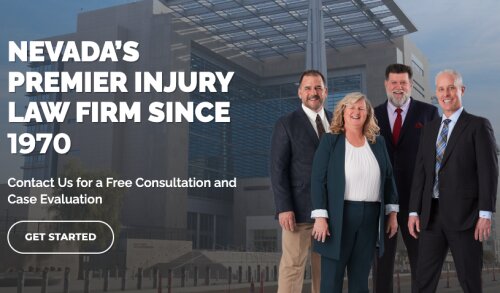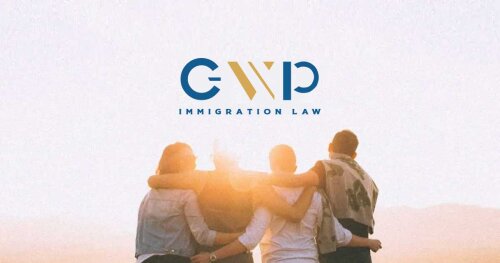Best Labor Law Lawyers in Las Vegas
Share your needs with us, get contacted by law firms.
Free. Takes 2 min.
List of the best lawyers in Las Vegas, United States
About Labor Law in Las Vegas, United States
This guide provides an easy-to-understand overview of labor law issues that commonly arise in Las Vegas and the broader state of Nevada. Labor law governs the legal relationship between employers and employees, covering topics such as wages and hours, discrimination and harassment, wrongful termination, workplace safety, union and collective bargaining rights, independent contractor classification, and workers compensation. Both federal laws and state laws apply in Las Vegas, and there are also local practices and industry-specific issues that are important in a city with a large hospitality and service economy.
Because regulations and procedures vary by the type of claim and by the body that enforces them, people often need tailored advice. This guide outlines when you might need a lawyer, key local legal points to know, frequently asked questions, resources to consult, and practical next steps if you believe your rights have been violated.
Why You May Need a Lawyer
Many workplace disputes can be resolved by contacting your employer or using internal HR procedures. However, a lawyer becomes important when the situation is complex, contested, or has legal deadlines. Common situations where you may need legal help include:
- Unpaid wages or unpaid overtime - employers who fail to pay wages, misclassify employees as independent contractors, or misapply overtime rules.
- Wrongful termination or retaliation - firing or adverse actions taken for discriminatory reasons, for whistleblowing, or for exercising protected rights.
- Discrimination and harassment - race, sex, age, disability, religion, pregnancy, national origin, and other protected categories under federal and state law.
- Wage deductions, tip pooling, and tipped-employee issues - disputes over tip distribution, service charges, and lawful payroll deductions.
- Workers compensation disputes - denial of benefits, disputes over medical treatment, or disputes over permanent disability ratings.
- Collective bargaining and union issues - unfair labor practices, union representation, or contract interpretation.
- Complex contract matters - severance agreements, noncompete and non-solicitation clauses, restrictive covenants, and confidential information disputes.
- OSHA and workplace safety concerns - when reporting unsafe conditions leads to retaliation or when serious safety violations occur.
- Administrative charge filing and litigation strategy - navigating deadlines and procedural requirements for filing with agencies like the EEOC, Nevada civil rights agencies, or the Labor Commissioner.
Lawyers can evaluate merits, preserve evidence, communicate formally with employers, negotiate settlements, file administrative claims, and, when needed, bring lawsuits. They also help identify potential remedies, which may include back pay, reinstatement, compensatory and punitive damages, penalties, and attorneys fees in some cases.
Local Laws Overview
Labor issues in Las Vegas are governed by a mix of federal law, Nevada state law, and local practice. Key points to keep in mind include:
- At-will employment - Nevada follows the at-will employment principle, which generally allows employers or employees to end the employment relationship at any time for any lawful reason. There are key exceptions - for example, when termination violates anti-discrimination laws, an employment contract, public policy, or is retaliatory.
- Wage and hour rules - Federal law under the Fair Labor Standards Act - and Nevada state law - regulate minimum wage, overtime, recordkeeping, and child labor. Nevada updates and enforces wage rules, and the state also administers claims for unpaid wages and damages through its Office of the Labor Commissioner and related agencies.
- Anti-discrimination and harassment protections - Federal laws such as Title VII, the Americans with Disabilities Act, the Age Discrimination in Employment Act, and state statutes protect employees from unlawful discrimination and harassment. Nevada has its own civil rights enforcement mechanisms that can be used alongside federal options.
- Workers compensation - Nevada requires most employers to carry workers compensation insurance. Disputes over coverage, benefits, and medical care are handled through the state workers compensation system, which has specific filing and appeal processes.
- Union and collective bargaining rights - Federal labor law governs union organizing, collective bargaining, and unfair labor practice complaints. Nevada law and local industry practices can affect how unions operate in sectors like hospitality, gaming, and construction.
- Industry-specific issues - Las Vegas has a large hospitality, gaming, entertainment, and construction sector. These industries have frequent issues such as tipped wage rules, complex scheduling, gig work and contractor use, service charge distribution, and employer-provided housing or lodging concerns.
- Administrative deadlines and parallel processes - Many employment claims require filing an administrative charge before a lawsuit can be brought. For example, discrimination claims often require an agency filing period and a right-to-sue letter before going to court. Wage claims, workers compensation appeals, and labor board complaints have their own timetables.
Because local practice and agency processes matter, consulting with a lawyer who understands Nevada procedural rules and the Las Vegas employment landscape is often beneficial.
Frequently Asked Questions
What does at-will employment mean in Nevada and are there exceptions?
At-will means either the employee or employer can end the relationship at any time for any lawful reason. Exceptions include statutory protections like anti-discrimination laws, contractual promises (written contracts or implied promises), public policy exceptions that prohibit firing for reasons like refusing illegal acts, and situations involving retaliation for protected activities. If you believe an exception applies, consult an attorney promptly because time limits can apply.
How do I recover unpaid wages or overtime?
If you have not been paid for work performed or overtime you earned, document hours, pay stubs, communications, and any pay policies. Many unpaid wage claims start with the employer or the state Office of the Labor Commissioner. A lawyer can help file a claim, pursue statutory penalties, and, if needed, sue for back pay, liquidated damages, and attorneys fees when allowed by law.
Am I an employee or an independent contractor?
Classification depends on the totality of the working relationship - control over how work is done, ability to work for others, provision of tools, degree of business risk, and payment method are factors courts and agencies consider. Misclassification can affect minimum wage, overtime, taxes, and benefits. If you suspect misclassification, seek legal guidance to evaluate the facts and pursue remedies.
How do I report workplace discrimination or harassment?
Start by documenting incidents - dates, times, witnesses, and communications. Many claims require filing with an administrative agency first - for federal claims that is the Equal Employment Opportunity Commission, and for state claims it may be a state civil rights agency. These agencies investigate and may issue a right-to-sue notice. An attorney can help you meet filing deadlines and represent you through the administrative process and any subsequent litigation.
Can my employer change my schedule or reduce my hours without notice?
In general, employers can change schedules and hours for at-will employees unless a contract, collective bargaining agreement, or state law says otherwise. Some local or state laws require notice for schedule changes or provide protections for certain workers. If the change violates a written agreement or is a form of retaliation or discrimination, you may have recourse.
What should I do if I am injured at work in Las Vegas?
Report the injury to your employer as soon as possible and follow employer reporting procedures. Seek medical treatment and keep records of medical visits and costs. If benefits are denied or underpaid, or if your employer retaliates for filing a workers compensation claim, consult a workers compensation attorney to navigate appeals and disputes.
Can my employer require me to sign a noncompete or confidentiality agreement?
Employers commonly use confidentiality and restrictive agreements, but enforceability depends on scope, duration, geographic limits, and state policy. Nevada scrutinizes overly broad noncompetes that unreasonably restrict a worker's ability to earn a living. You should have any agreement reviewed before signing and consider negotiating terms or seeking legal advice if you are asked to sign as a condition of employment or severance.
How long do I have to file a lawsuit for an employment claim?
Time limits vary by claim and by the agency involved. Some administrative charges must be filed within months of the discriminatory act, then you may have a limited time to file a civil lawsuit after receiving a right-to-sue notice. Wage claims and workers compensation appeals also have specific deadlines. Consult a lawyer quickly to preserve rights and meet critical deadlines.
Will I have to go to court or can the case settle?
Many employment disputes settle through negotiation or alternative dispute resolution such as mediation. Settlement is often possible and can be faster and less costly than litigation. However, if the employer is unwilling to settle or the claim requires a court decision, litigation may be necessary. An attorney can advise on settlement offers and litigation strategy.
How do I find a good employment lawyer in Las Vegas?
Look for lawyers with experience in the specific area of labor law you need - wage claims, discrimination, workers compensation, unions, or employment contracts. Ask about results in similar cases, fee structure - hourly, contingency, or flat fee - and whether they will handle your case personally. Use lawyer referral services, local bar association resources, and client reviews, and take advantage of initial consultations to evaluate fit.
Additional Resources
Below are key agencies and organizations that commonly handle labor-related issues. Contacting the appropriate agency is often the first step for many claims.
- State labor enforcement office - the Nevada agency that handles wage and hour complaints and related workplace enforcement.
- State civil rights enforcement agency - for claims of discrimination under state law.
- Federal Equal Employment Opportunity Commission - for claims under federal anti-discrimination laws.
- U.S. Department of Labor - Wage and Hour Division - for federal minimum wage and overtime issues, and for information on child labor and related standards.
- National Labor Relations Board - for union organizing, collective bargaining, and unfair labor practice complaints.
- State workers compensation board or commission - for workplace injury claims and benefit disputes.
- Local legal aid organizations and pro bono clinics - for low-income workers who need representation or advice.
- State Bar lawyer referral services and local employment law attorney directories - to find qualified attorneys in your area.
- Local law libraries and community legal education programs - for self-help materials and sample forms.
Next Steps
If you believe you have an employment problem that requires legal help, take the following steps to protect your rights and prepare for a consultation with a lawyer:
- Document everything - keep copies of pay stubs, time records, employment agreements, emails, performance reviews, text messages, and a calendar of important events and conversations.
- Report issues internally when appropriate - notify HR or a supervisor in writing when possible, so there is a record of your complaint unless doing so would put you at risk.
- Note deadlines - find out whether an administrative charge must be filed with a federal or state agency and when the limitations period expires. Acting promptly can preserve your claim.
- Preserve evidence - save electronic files and avoid deleting messages. If the employer may destroy documents, mention this to an attorney immediately.
- Consider early legal advice - many lawyers offer brief initial consultations. An employment attorney can evaluate whether you should file an administrative charge, negotiate with your employer, or proceed to litigation.
- Explore alternative resources - if cost is a concern, contact local legal aid organizations, union representatives, or government offices that may provide low-cost or free guidance.
- Prepare for your attorney meeting - bring documentation, a timeline of events, desired outcome, and questions about fees, likely strategies, and potential remedies.
Remember that this guide is informational and not a substitute for personalized legal advice. Employment law matters often involve strict procedural rules and deadlines, so if you think your rights have been violated, reach out to a qualified employment lawyer or an appropriate governmental agency as soon as possible.
Lawzana helps you find the best lawyers and law firms in Las Vegas through a curated and pre-screened list of qualified legal professionals. Our platform offers rankings and detailed profiles of attorneys and law firms, allowing you to compare based on practice areas, including Labor Law, experience, and client feedback.
Each profile includes a description of the firm's areas of practice, client reviews, team members and partners, year of establishment, spoken languages, office locations, contact information, social media presence, and any published articles or resources. Most firms on our platform speak English and are experienced in both local and international legal matters.
Get a quote from top-rated law firms in Las Vegas, United States — quickly, securely, and without unnecessary hassle.
Disclaimer:
The information provided on this page is for general informational purposes only and does not constitute legal advice. While we strive to ensure the accuracy and relevance of the content, legal information may change over time, and interpretations of the law can vary. You should always consult with a qualified legal professional for advice specific to your situation.
We disclaim all liability for actions taken or not taken based on the content of this page. If you believe any information is incorrect or outdated, please contact us, and we will review and update it where appropriate.











